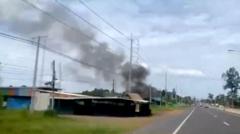Amid escalating tensions and a backdrop of historical conflicts, a recent border skirmish at the Thailand-Cambodia border has resulted in casualties, raising concerns about the fragility of diplomatic relations between the neighboring countries. The situation escalated after a landmine explosion injured Thai soldiers, and leaked communications between government leaders fanned the flames of animosity. With both nations standing firm in their positions, the risk of further clashes remains.
Fractured Ties Fuel Renewed Violence at Thailand-Cambodia Border

Fractured Ties Fuel Renewed Violence at Thailand-Cambodia Border
Recent violence has erupted along the Thailand-Cambodia border, highlighting deteriorating relations between the two nations.
Recent clashes have erupted along the border between Thailand and Cambodia, driven by a series of political missteps and deteriorating relationships. Historically tense, the two nations share a disputed border characterized by a mix of cultural ties and military conflict. Following a landmine explosion that injured Thai soldiers, violence escalated, resulting in multiple civilian deaths.
Relations soured sharply last month when a leaked phone call from Thailand’s Prime Minister Paetongtarn Shinawatra to Cambodian leader Hun Sen caused embarrassment and public outrage in Thailand. The fallout from the call resulted in her suspension, highlighting the fragile nature of diplomatic ties.
On the surface, the call seemed innocuous, with Shinawatra referring to Hun Sen as "uncle." However, it underscored long-standing tensions and sparked a renewed wave of hostilities, with both countries now investigating each other’s political and business figures for corruption and underworld connections.
Hun Sen has intensified rhetoric against Thailand, claiming to possess incriminating evidence against Thaksin Shinawatra, further complicating the diplomatic landscape. The Thai government has responded with expulsions, setting a confrontational tone in the region.
Both governments currently face significant domestic challenges: Thailand grapples with an unstable coalition amid an economic downturn, while Cambodia’s economy flounders in the wake of pandemic recovery efforts. The lack of strong, unifying leadership in both nations poses risks of prolonged conflict.
As the two sides entrench themselves in their positions, the potential for conflict escalation looms large. Observers are left to wonder whether Asean might intervene to facilitate a de-escalation of hostilities. Nevertheless, the motivations behind Hun Sen's decision to provoke tensions at such a precarious moment remain unclear, raising questions about the future of diplomatic relations between these two neighbors.
Relations soured sharply last month when a leaked phone call from Thailand’s Prime Minister Paetongtarn Shinawatra to Cambodian leader Hun Sen caused embarrassment and public outrage in Thailand. The fallout from the call resulted in her suspension, highlighting the fragile nature of diplomatic ties.
On the surface, the call seemed innocuous, with Shinawatra referring to Hun Sen as "uncle." However, it underscored long-standing tensions and sparked a renewed wave of hostilities, with both countries now investigating each other’s political and business figures for corruption and underworld connections.
Hun Sen has intensified rhetoric against Thailand, claiming to possess incriminating evidence against Thaksin Shinawatra, further complicating the diplomatic landscape. The Thai government has responded with expulsions, setting a confrontational tone in the region.
Both governments currently face significant domestic challenges: Thailand grapples with an unstable coalition amid an economic downturn, while Cambodia’s economy flounders in the wake of pandemic recovery efforts. The lack of strong, unifying leadership in both nations poses risks of prolonged conflict.
As the two sides entrench themselves in their positions, the potential for conflict escalation looms large. Observers are left to wonder whether Asean might intervene to facilitate a de-escalation of hostilities. Nevertheless, the motivations behind Hun Sen's decision to provoke tensions at such a precarious moment remain unclear, raising questions about the future of diplomatic relations between these two neighbors.


















